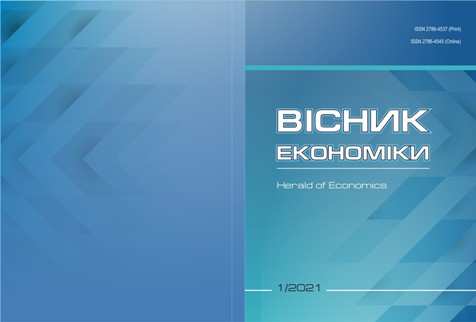Accounting practice and reporting in cooperatives of the Halychyna district in Lviv
DOI:
https://doi.org/10.35774/visnyk2024.01.081Keywords:
historiography, accounting, reporting, World War II, Ukrainian cooperation, chart of accounts, income and expense accountingAbstract
Introduction. The content and conceptual parameters of the accounting and reporting system, which was used to form information about the activities of the restored Western Ukrainian cooperation during the Second World War, are given. The organizational and methodical components of accounting practice and accounting reporting are disclosed through the imperative prescriptions of the occupation government to reflect the financial and economic status (balance sheet items) and economic activity (reporting indicators) of cooperatives in the General Governorate, with the highlighting of regulatory provisions within the scope of the “Galichyna” script.
Purpose. The purpose of the article is to conduct an accounting discourse regarding the conditions and nature of the reorientation of socially oriented corporate accounting previously formed on the basis of the German accounting school in the system of restored Ukrainian cooperation during the Second World War.
Methods. The research methodology is based on the application of the narrative principles of historical research and is based on the principle of reconstructivism using the interpretive approach and the abstract-logical method, which in short provided the basis of scientific knowledge about the nature (content aspects) of accounting as a function of managing the united Ukrainian cooperative in Galicia.
Results. The general result of the research is the establishment of facts that the construction of the accounting practice and the reporting system by the occupation authorities was carried out from the position of their use as tools for the exercise of official control over the activities of the Ukrainian cooperation. The article presents the general principles of accounting and reporting of the economic and economic activity of the subjects of Ukrainian cooperation, in particular, some provisions of taxation and formation of prices for accounting purposes. The content of the “minimum chart of accounts” was revealed, on the basis of which “simplified accounting” was organized for corporate entities during the implementation of the “unified chart of accounts” program as the basis for the functioning of the so-called “systematic accounting” structure. The research results presented in the article confirm that the Nazi authorities maximized the function of accounting control in this way.
Perspectives. A promising direction for further research into the practice of cooperative accounting during the Second World War should be considered the expediency of in-depth clarification of the consequences of the fundamental lack of connection between cost accounting and accounting evaluation based on the official price system with an emphasis on the tax function of this type of accounting and reporting system in the direction of fiscalism.
References
Mokrynska Z. V. (2021). Bukhhalterskyi oblik ta zvitnist u kooperatyvakh heneralnoho hubernatorstva v 1939-1944 rokakh. [Accounting and reporting in cooperatives of the general government in 1939-1944]. Ekonomika ta derzhava - Economy and the state, 4, 115–121 doi: 10.32702/2306-6806.2021.4.115 [in Ukrainian].
Turzyński M. (2014) Rachunkowość czasu II wojny światowej w okupowanej Polsce: przypadek Generalnego Gubernatorstwa. Zeszyty Teoretyczne Rachunkowości, 80 (136), 225-243 [in Polish].
Rachunkowość w okresie II wojny światowej (2021). Seminarium Naukowe: zorganizowała Katedra Rachunkowości na Wydziale Zarządzania Uniwersytetu Łódzkiego za pośrednictwem systemu MS TEAMS w dniu 2 czerwca 2021 roku:https://www.wz.uni.lodz.pl/katedra-rachunkowosci/szczegoly/seminarium- naukowe-pt-rachunkowosc-w-okresie-ii-wojny-swiatowej [in Polish].
Funnel W. (1998) Accounting in the service of the Holocaust. Critical Perspectives on Accounting, 9 (4), 435-464 [in English].
Lippmann E., Wilson P. (2007). The culpability of accounting in perpetuating the Holocaust. Accounting History, 12 (3), 283-303 [in English].
Szychta A. (2021). Zarys rozwoju planu kont w Polsce. «Zeszyty Teoretyczne Rachunkowości», t. 6 (62), SKwP, Warszawa. Źródła prawa Rozporządzenie Rządu Generalnego Gubernatorstwa o prowadzeniu książki przychodu towarów z 30 września 1941 r., 93, 576 [in Polish].
Sobańska I. (1997) Tendencje rozwoju rachunku kosztów w Niemczech. Wydawnictwo Uniwersytetu Łódzkiego, Łódź [in Polish].
Derzhavnyi arkhiv Lvivskoi oblasti, m.Lviv (DALO – fondy periodu okupatsii Ukrainy natsystskoiu Nimechchynoiu - 1941-1944 rr.) [funds of the period of occupation of Ukraine by Nazi Germany - 1941-1944.]. Fond R-35. Gouverneur des Distrikt Galizien in Lemberg [in German].
DALO. Fond R-37. Stadthauptmann Stadtverwaltung in Lemberg [in German].
Sycz M. (1997). Spółdzielczość ukraińska w Galicji w okresie II wojny swiatowej. Warszawa, Pracownia Wydawnicza, 322 [in Polish].
Szczepanczyk Cz. (1978). Polityka okupanta wobec spoldzielczosci wiejskiej w Generalnej Guberni. Warszawa, Ludowa Spoldzielnia Wydawnicza, 300 [in Polish].
DALO. Fond R-75. Revizionsverband dem Genossenschaften im General- Gouvernement. Distriktverband Galizien [in German].
DALO. Fond R-266. Ukrainische Landesgenossenschaft «Zentrosojuz» in Lemberg [in German].
DALO. Fond R-74. «Narodna Torhiwla», Landesgenossenschaft für Lebensmittel mit Anteilshaftung in Lemberg [in German].
DALO. Fond R Р-102. Staatliche landwirtschaftliche Institute Lemberg. Staatliche landwirtschaftliche Fahrkurse Lemberg [in German].
Iwaszkiewicz Z. (1941). Teoria i praktyka księgowości kupieckiej. Zasady systemu podwójnego. Księgowość w handlu detalicznym. Metody: tabelaryczna i włoska, Warszawa Wydawnictwo Polskie [in Polish].
Gater R. (1942). Anleitung für eine Mindest-Buchführung kleiner Handelsbetriebe im Generalgouvernement: Schriftenreihe der Gruppe Handel in der Hauptgruppe Gewerbliche Wirtschaft und Verkehr in der Zentralkammer für die Gesamtwirtschaft im Generalgouvernement. Kraków Verlag für Wirtschaft und Handwerk [in German].
Richard J. (1995). The evolution of accounting chart models in Europe from 1900 to 1945. European Accounting Review, 4 (1), 87-124 [in English].
Gater R., Wittich R., Gerlach F. (1942). Der Einheitskontenplan für Industriebetriebe im Generalgouvernement. Leitfaden für die Einführung eines geordneten Rechnungswesens, Reischskuratorium für Wirtschaftlichkeit. Dienststelle Generalgouvernement, Beuth-Vertrieb, Berlin [in German].



